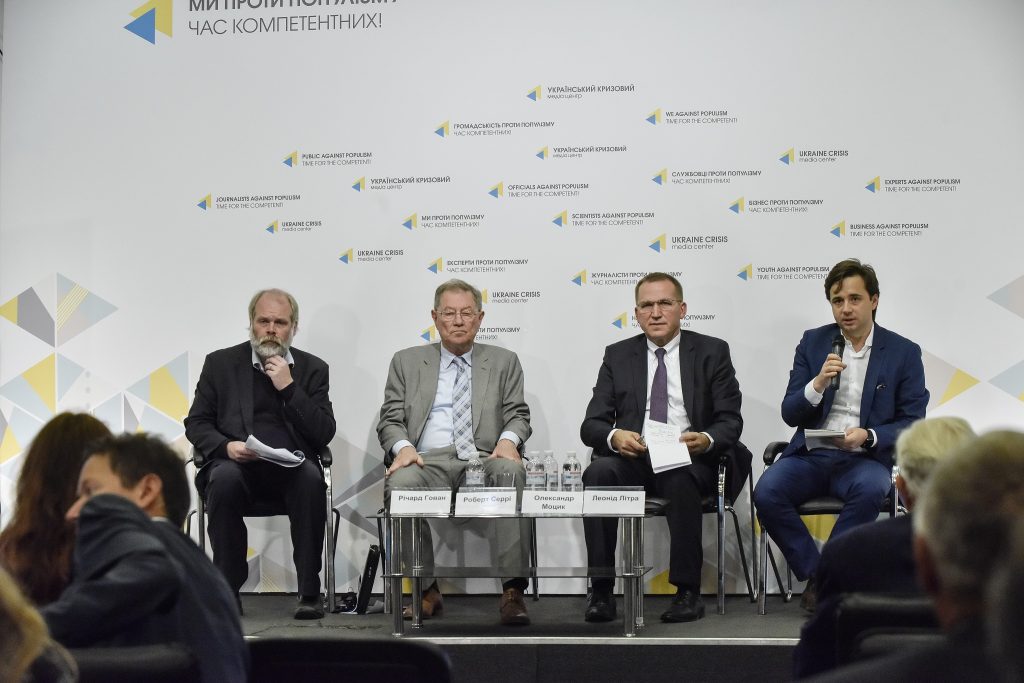UN peacekeeping mission in the area of combat operations in eastern Ukraine will only be possible if Russia and Ukraine can agree on certain compromises and on the consistency of fulfilment of the obligations envisaged by the Minsk Agreements. The peacekeeping contingent should consist of at least 20 thousand peacekeepers, mostly from European non-NATO countries, and be stationed throughout the entire territory of Donetsk and Luhansk regions (ORDLO), including the Ukrainian-Russian border area, which is currently not controlled by Ukraine. Such were the main theses, expressed by international experts during the public discussion “What kind of peacekeeping mission Ukraine needs?” at the Ukraine Crisis Media Center.
“The most important finding [of my study] is that a peacekeeping operation in itself is not an answer to the problem of the Donbas. [It] is some form of strategic compromise between Russia, Ukraine, and Ukraine’s Western allies on withdrawing Russian forces from the region and allowing the reintegration of the region (…) into Ukraine. That is a political decision, which Russia has to make, and how Russia gets to that decision is something that we all are still struggling with,” said Richard Gowan, leading expert at the New York University’s Center for International Cooperation, author of the study “Can the United Nations Unite Ukraine?”
Robert Serry, diplomat, former UN Special Coordinator for the Middle East Peace Process, co-author of the “Blue Helmets in Donbas?” study, said that all issues that need to be taken into account during a peaceful settlement are already set out in the Minsk Agreements. The problem is that the exact sequence of these steps is not defined. “It is necessary to agree to a phased and sequenced scenario to unlock the Minsk agreements and restore peace in Ukraine, (…) because the parties have a videly different views on what needs to happen first,” he explained.
Richard Gowan and Robert Serry share the view that UN peacekeeping contingent should have 20 thousand peacekeepers and be deployed throughout the ORDLO, including the Ukrainian-Russian border, in order to allow the Ukrainian side to regain control of these territories. “At the same time, it is necessary that Russia complies with article 10 of the agreements – regarding the complete withdrawal of foreign forces and mercenaries,” said Robert Serry. Peacekeepers should have a power to restrict the use of force, control over the air, possess intelligence tools, and control the withdrawal of military equipment. At the same time, the Special Monitoring Mission of the OSCE should continue its work, with a greater emphasis on socio-political issues, and monitoring the Ukrainian-Russian border.
Richard Gowan added that the proposal for a peace-enforcement operation, which involves the introduction of 50-60 thousand peacekeepers without the obligatory consent of the parties, is unrealistic, since most countries would not agree to send their peacekeepers to an area, where the military conflict is in the active phase.
According to the experts, the peacekeeping contingent should consist mainly of representatives of European non-NATO countries – in particular, Sweden and Finland, and other countries with vast experience in peacekeeping operations. Participation of the partner countries of Russian Federation is also possible, to a limited extent, provided it will allow the participation of a certain number of peacekeepers from NATO member countries.
Both experts share the view that there is no need to implement a temporary international administration in ORDLO, like in Kosovo. “I think that there are many elements of governance that Ukrainian authorities could take over almost immediately in the reintegration process, possibly with some form of international assistance and oversight,” said Richard Gowan. “[We will need] an interim civilian administration, (…) it is important that Ukraine starts to comit itself from the beginning, for example, the organization of elections should be done in cooperation with Central Electoral Committee,” added Robert Serry.
Ukrainian side expects that the peacekeeping mission will consist of at least 20 thousand peacekeepers, 5 thousand police officers and several thousand civilian administrative personnel during the transition period, said Oleksandr Motsyk, representative of Ukraine in the working group on political issues of the Minsk Trilateral Contact Group on the settlement of the situation in Eastern Ukraine. Peacekeepers must be deployed throughout the ORDLO, including a collision line. In this case, peacekeepers should have the right to have free and immediate access to all places of weapons’ storage and to strategic objects. As for the contributing countries, Ukrainian side understands the need for a balanced mission, so that Russia will agree to this plan. Leadership should be provided by neutral European countries, primarily Finland, Sweden and Austria. “If Belarus and Kazakhstan, which are parties to the Tashkent Treaty, join the mission, then NATO members, such as Spain, as well as the neighbours of Ukraine – Poland and the Baltic countries – who are well aware of the real situation, should be included in the mission,” the diplomat added.
Oleksandr Motsyk noticed that the negotiations with Russia have now actually come to a standstill – the Russian side is not ready to compromise in determining the format of the peacekeeping mission, which makes its implementation in the near future unrealistic. “The peacekeeping mission in Donbas is needed, but not in the format, suggested by Russian Federation – to place peacekeepers only along the contact line, in order to protect the OSCE monitoring mission. Such an approach would clearly lead to freezing a conflict for many years (…) The peacekeeping mission – this is our vision and our demand – should lead to the restoration of the territorial integrity of Ukraine and Ukrainian authority in Donbas – in accordance with the provisions of Minsk Agreements, but this should be 100% restoration sovereignty of Ukraine “, – said Oleksandr Motsyk.




